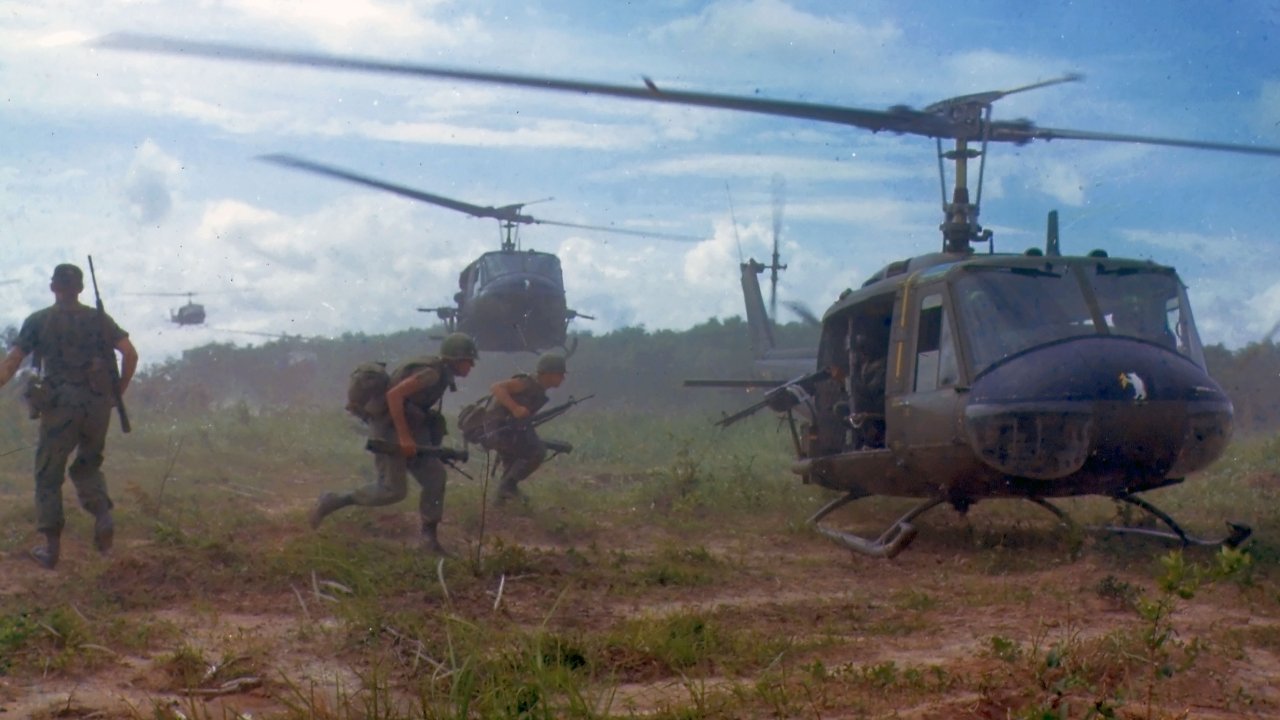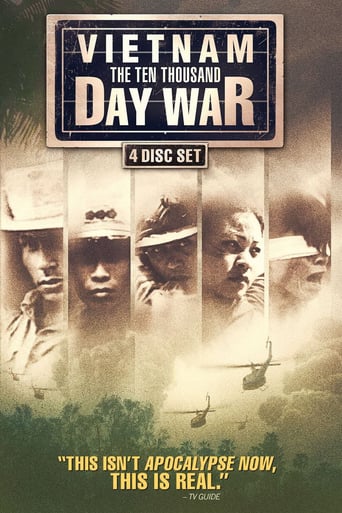timcon1964
The Ten Thousand Day War: Vietnam, 1945-1975 is a 26-part documentary about the war in Vietnam, produced by the Canadian Broadcasting Corporation. It was conceived by Michael Maclear, a Canadian broadcast journalist and film maker, who had spent some time in North Vietnam during the war. Maclear's wife, Mariko Koide, a Japanese news researcher, had contacts which helped Maclear gain access to archival film from North Vietnamese military and civilian organizations (unfortunately, this film, in black and white, is of poor quality). This series also employs film from Canadian, French, Australian, and Japanese news organizations, from the U.S. National Archives, and the Nixon, Kennedy, Johnson, and Ford Presidential Libraries. The script was written by Peter Arnett (who won a Pulitzer Prize in 1966 for his reporting on Vietnam), and narrated by actor Richard Basehart. Interviews with a wide range of U.S. and Vietnamese officials (especially Nguyen Cao Ky and Nguyen Van Thieu), and American military officers and soldiers provide important perspectives on the war. There is less input from the other side, mainly from Australian reporter Wilfred Burchett, and Ha Van Lau. The series opens with "America in Vietnam," a 51-minute overview of U.S. involvement in Vietnam from 1945 to 1975. Most of the 25 subsequent 25-minute programs are devoted to a general history of the war (with some overlapping between programs), beginning with a brief account of Vietnamese anti-colonialist activities before WWII, and a description of how the Viet Minh and the OSS fought together against the Japanese during World War II. During that war, the U.S. opposed restoration of French rule in Viet Nam; but after the war, and especially after the Communist victory in China and the outbreak of the Korean War, the U.S. began assisting the French in Vietnam. The Ten Thousand Day War devotes an entire program to the battle of Dien Bien Phu, then discusses the Geneva Conference, the Diem regime, and the assassination of Diem, Viet Cong guerrilla warfare against South Viet Nam, the Tonkin Gulf incident, growing U.S. involvement through advisers, bombing, and ground troops, the siege of Khe Sanh, the TET offensive, Nixon's Vietnamization policy, peace negotiations, the final military campaign, and U.S. withdrawal from Viet Nam. Along the way, we learn about Viet Cong tunnel systems, American air and naval firepower, body counts, the limitations of the Army of South Viet Nam, and the impact of the U.S. presence on Vietnamese officials and people, In addition to this general history of the conflict, The Ten Thousand Day War includes special programs focused on each of the following specific aspects of the war: (1) North Vietnamese society, (2) the Ho Chi Minh Trail, (3) the weapons of the U.S., the North Vietnamese, and the Viet Cong, (4) each side's efforts to gain the support of the villages, (5) the air war, (5) the anti-war movement in America, (6) the lives of American troops in the field, and (7) the experiences of American prisoners of war. Many Americans who lived through it are likely to be highly critical about things that were done or not done during the war. They may be dissatisfied with this Canadian-produced series, which, to a great extent, avoids taking sides, between South and North Vietnam, between military and civilian officials, or between hawks and doves. Reviewers have expressed vastly different views, one characterized this series as "government propaganda," another commented that it "demonstrates Washington's systematic blundering and inefficiency," and another, who identified himself as a Vietnam veteran, described it as "the finest and most complete history of the Vietnam War I have ever seen." In the final program, "Vietnam Recalled," a wide cross section of diplomats, military officers, politicians, and soldiers provide a wide range of assessments of America's Vietnam policies. Among them are Ellsworth Bunker, Clark Clifford, William Colby, William Fulbright, Robert Komer, Melvin Laird, Henry Cabot Lodge, Eugene McCarthy, Dean Rusk, Arthur Schlesinger, Maxwell Taylor, and William Westmoreland. There is no equivalent commentary from the other side. In any case, throughout the war, there seems to have been little divergence of policy views among North Vietnamese leaders. With regard to Vietnamese memories of the war, it is perhaps sufficient to note that roughly 5 per cent of Vietnam's people died during the conflict. The Ten Thousand Day War cannot be considered a definitive history of the conflict. The Vietnamese were involved in fighting for even more than ten thousand days. Guerrilla action against the French actually began before 1940, and was followed by operations against the Japanese during World War II. After 1975, Vietnam was engaged in combat against Cambodia and China. The series neglects much of the diplomacy behind the war, the backgrounds of South Vietnamese leaders, and the course of South Vietnamese political developments. Moreover, like many documentary films, it is largely guided by the availability of motion picture images. Thus, combat operations—of which there is much film footage—tend to receive more attention than diplomatic and military policy decisions (e.g., McNamara's change of heart, government misperceptions and misrepresentations, peace negotiations, etc.), which took place away from the cameras. Maclear also wrote a companion volume, The Ten Thousand Day War: Vietnam, 1945-1975 (1981), which provides much additional information.
Zando777
All The Americans did was try to protect the South Vietnamese from North Vietnamese, Communist Oppression. They gave them every opportunity to defend themselves, with considerable money and sacrifice. Sadly, the South was unable to take advantage of that assistance, and protect themselves. However, that was not the fault of the Americans, nor did it make the effort unworthy.Today, Vietnam is turning to capitalism, and hopefully, they will eventually turn to democracy as well. However, there is no question that South Vietnam would have been far better off if it had never had to deal with Communist oppression in the first place.Ultimately, is is sad that the South was not able to benefit from American assistance, and develop a viable non-communist government. But the Americans can not be blamed for this, and they certainly should not be blamed for trying to do the right thing. Few democracies would exist today, of course, if not for American assistance and intervention.
verbusen
The Internet is a wondrous thing is it not? I am watching a taped episode of one of my all time favorite documentaries, "Vietnam:The Ten Thousand Day War", from my DVR in Florida USA to my laptop in Kuwait; I'm writing a review about this series and have just read another review from someone who actually lives in Vietnam! Amazing. I would like to just say that for Minh Nguyen to make the statement that America brought the war to Vietnam is one sided. I know America was the main player in the west but it takes two sides to wage war. The Soviets and the Chinese were major arms providers to the North so why Mr Nguyen doesn't mention them as partially to blame is showing an ignorance (well, I think we all know why he doesn't mention them, either ignorance from being raised in a communist system and its political dogma, or because he to scared to say the truth for fear of being arrested.). Also, Mr Nguyen, I guess the parts about the North being the main aggressor it whole war were not shown in your country so to blame America again shows ignorance. Regardless, its interesting to read a review from Vietnam (of course that could be made up as well but I'll take that as real), at least the communist east is somewhat open. As far as the mini series; why do I love it? It doesn't focus on the American involvement solely. This was a war that started 15 years before America got involved and the series covers every facet of the history so thats a real plus. The footage used is first rate, all the Vietnam War programs you see made now will use the same footage so you are not missing anything by watching this older series. The date this series was made is another plus. It has all the major players being interviewed which you can't do now because they are dead from old age, it's a major historical reference. Third, Richard Basehart adds a very distinctive narrative voice, his voice sounds as distinguished as James Earl Jones voice would and I think thats very steep praise. I don't think you could find a better war documentary ever made, it's like taking the relatively modern technology of 1980 and transplanting it to the year 1950 and interviewing all the generals and politicians on both sides of world war two, it does that for the Vietnam War.OK, I do see some bias, its subtle, a 1970's-80's style subtle bias kind of like NPR "All Things Considered" bias where it all seems so straight forward but when you blink you end up shaking your head. In this shows case the later episodes don't throw a whole lot of light on the role of the media and propaganda in general, all useful tools to influence the outcome of a war, DON'T YOU THINK????? From an OIF War Veteran going through the same thing 30 years later.

